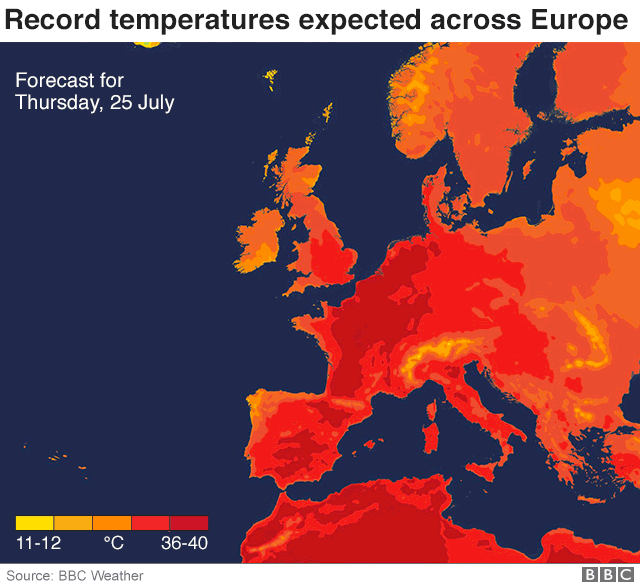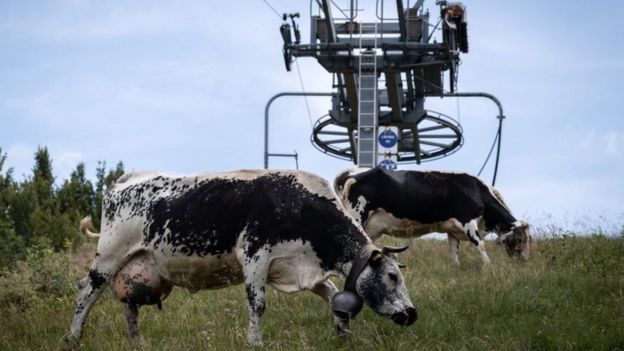
The French city of Bordeaux has hit its highest temperature since records began, as Western Europe braces for the second heatwave to hit this summer.
On Tuesday, Meteo France registered 41.2C (106.1F) in the south-western city, breaking a 2003 record of 40.7C.
Forecasters predict a record-breaking run across Europe this week, including Belgium, Germany and the Netherlands.
A World Meteorological Organization (WMO) spokeswoman said the heatwaves bore "the hallmark of climate change".
"As we saw in June they are becoming more frequent, they're starting earlier and they're becoming more intense," Claire Nullis added. "It's not a problem that's going to go away."
Much of France has been issued with an orange alert - the second highest level of warning.
Meteo France said Paris temperatures might hit new highs on Thursday. The record, set in 1947, stands at 40.4C.
Comparisons have been drawn to a heatwave France experienced in August 2003, during which heat contributed to almost 15,000 deaths.

The mercury is also expected to climb to 40C in a string of countries:
To limit the heating of water used to keep its nuclear reactors cool, French energy firm EDF said it would be shutting two reactors at the Golftech nuclear power plant in the southern Tarn-et-Garonne region.
Ice foot baths and extra water points are being made available to cyclists competing in the Tour de France - which is entering its final week - to avoid dehydration.
The French government is outlawing animal transportation "for economic reasons" between 13:00 (11:00 GMT) and 18:00 in areas affected by heat alerts.
The French weather service has reported temperatures of 42C in areas of the south-west. It is expected the heat will not dip below 20C for the rest of the week.
An intense heatwave swept through areas of Europe last month, making it the hottest June on record.
France set an all-time high-temperature record of 46C, according to the WMO, and new June highs were set in the Czech Republic, Slovakia, Austria, Andorra, Luxembourg, Poland, and Germany.
The continent has also been hit by severe droughts, particularly in France, with no rainfall in many areas since last month's heatwave.
A number of places in France have set new records for the lowest amount of rainfall ever recorded, Ms Nullis of the WMO said.
This has caused problems with nuclear energy facilities and agriculture - such as grape harvests for wine in the region and crops. Farmers in mountainous areas have been allowing cattle to graze on what are ski slopes in winter due to the effect of the drought on lower ground.

Cows graze on a ski slope on the ridge of the Vosges mountains as droughts hit lower ground
The government has imposed restrictions on water use in 73 regions and Paris has seen its driest period for almost 150 years.
France will send a request to the European Commission to bring forward a payment of €1bn ($1.12bn; £892m) to assist farmers hit by the recent weather.
Linking a single event to global warming is complicated. While extreme weather events like heatwaves occur naturally, experts say these will happen more often because of climate change.
Records going back to the late 19th Century show that the average temperature of the Earth's surface has increased by about one degree since industrialisation.
A climatology institute in Potsdam, Germany, says Europe's five hottest summers since 1500 have all been in the 21st Century.
Scientists are concerned that rapid warming linked to use of fossil fuels has serious implications for the stability of the planet's climate.